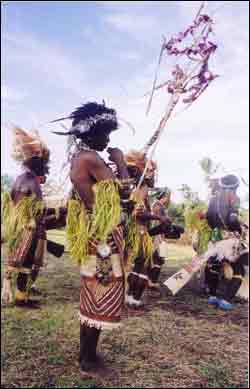Barkcloths demonstrate women’s importance

Maisin women and men perform their dances to mark a church festival. The dances and body decorations express not only religious identity, but also gender, clan and tribal identity.
Dutch researcher Anna-Karina Hermkens has produced a description and analysis of the dynamics of gender and identity in the culture of the Maisin, an indigenous group from Papua New Guinea. She made this analysis by following the production and use of an object made by the women, painted barkcloth.
In her thesis Anna-Karina Hermkens provides insights into the life and culture of the Maisin from a previously undescribed female perspective. This reveals the importance of women and female objects in ceremonial exchange systems, which within traditional anthropology are always associated with and studied from a male perspective. However women and their goods were found to play a crucial role in both formal and informal exchanges.
The production and use of barkcloths was found to be related to ideas about gender and sexuality. The commercialisation of these cloths also has consequences for local relationships between men and women and for the position of women in general.
Maisin is a language group of about 3000 speakers, of which some 2000 live along the coast of Collingwood Bay in Papua New Guinea. The 36 clans live over 10 villages and mostly make their living from fishing and horticulture. Intensive and extensive exchange networks exist between the clans and also with neighbouring groups. The ceremonial and economic exchange of barkcloths plays a major role in this.
Barkcloths
The cloths, which are made from the bark of paper mulberry trees and have black patterns filled in with red, are intertwined with the past present and future of the Maisin. They are the most important medium for the Maisin to make themselves seen and heard, and to obtain money for schooling, medicines, clothes and other ’essential’ goods.
Hermkens carried out 12 months of anthropological fieldwork under the Maisin in 2001-2002. Before and after this fieldwork period the anthropologist carried out extensive research at museums in the Netherlands, Switzerland, Austria, Australia and Papua New Guinea. By cataloguing and studying archives and museum collections related to the Maisin of Collingwood Bay, she gained a better understanding of the traditions associated with and changes in barkcloths. This also enabled her to place the present production and consumption of barkcloths in an historical colonial and postcolonial context.
Anna-Karina Hermkens’ research was funded by NWO.
Media Contact
More Information:
http://www.maw.ru.nlAll latest news from the category: Social Sciences
This area deals with the latest developments in the field of empirical and theoretical research as it relates to the structure and function of institutes and systems, their social interdependence and how such systems interact with individual behavior processes.
innovations-report offers informative reports and articles related to the social sciences field including demographic developments, family and career issues, geriatric research, conflict research, generational studies and criminology research.
Newest articles

First-of-its-kind study uses remote sensing to monitor plastic debris in rivers and lakes
Remote sensing creates a cost-effective solution to monitoring plastic pollution. A first-of-its-kind study from researchers at the University of Minnesota Twin Cities shows how remote sensing can help monitor and…

Laser-based artificial neuron mimics nerve cell functions at lightning speed
With a processing speed a billion times faster than nature, chip-based laser neuron could help advance AI tasks such as pattern recognition and sequence prediction. Researchers have developed a laser-based…

Optimising the processing of plastic waste
Just one look in the yellow bin reveals a colourful jumble of different types of plastic. However, the purer and more uniform plastic waste is, the easier it is to…



